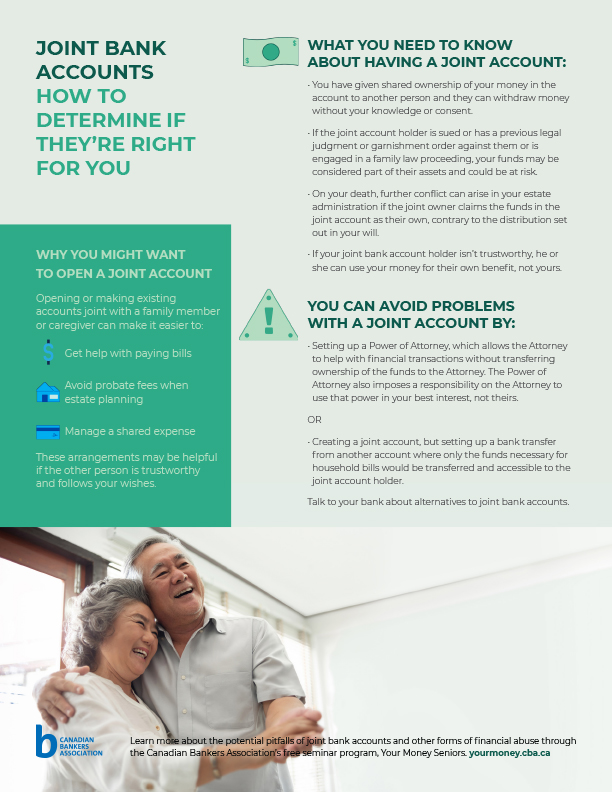As part of the estate planning process, in some provinces, some financial or legal advisors may encourage their clients to establish joint accounts with their heirs as an estate planning tool to avoid probate fees or the process itself.
Under certain provincial laws, there may be some benefits to this strategy although they are often outweighed by the risks described below. If you request in person (not through a Power of Attorney – see Opening a Bank Account with a Power of Attorney), that a joint account be opened and your bank has no reason to think that you are not capable of making this decision, they will usually open the joint account.
Be aware of the potential for abuse /conflict with a joint account
 If you open or make existing accounts joint with a family member or caregiver to make it easier for that person to assist with paying bills, etc., or for estate planning purposes to avoid probate fees, you make that person a co-owner of the funds in the account. This arrangement may be harmless if the other person is trustworthy and follows your wishes. But, if not, an abuser can take over the funds in a joint account and use them for their own benefit, not yours.
If you open or make existing accounts joint with a family member or caregiver to make it easier for that person to assist with paying bills, etc., or for estate planning purposes to avoid probate fees, you make that person a co-owner of the funds in the account. This arrangement may be harmless if the other person is trustworthy and follows your wishes. But, if not, an abuser can take over the funds in a joint account and use them for their own benefit, not yours.
You should also consider that, if the joint account holder is sued or has a previous legal judgment or garnishment order against them or is engaged in a family law proceeding, your funds may be considered part of their assets and could be at risk. Conflict can arise if you or your Attorney do not agree with how that person is operating the joint account. On your death, further conflict can arise in your estate administration if the joint owner claims the funds in the joint account as their own, contrary to the distribution set out in your Will.
A safer alternative to a joint account is a Power of Attorney, which allows the Attorney to help with financial transactions without transferring ownership of the funds to the Attorney.
Or, if the purpose of the account is for the other joint account holder to assist you with paying household bills, a joint account for that purpose could be established, but you could set up a bank transfer from another account where only the funds necessary for household bills would be transferred and accessible to the joint account holder. Keep in mind, however, that if you give a POA to the same person who is joint on the account, the Attorney may be able to move funds from your other account to the joint account, potentially creating the risks mentioned above.
This text only provides general information and does not constitute a legal opinion. Since the POA rules vary between provinces, the CBA strongly encourages you to seek advice from a legal expert before making any decision in these matters.